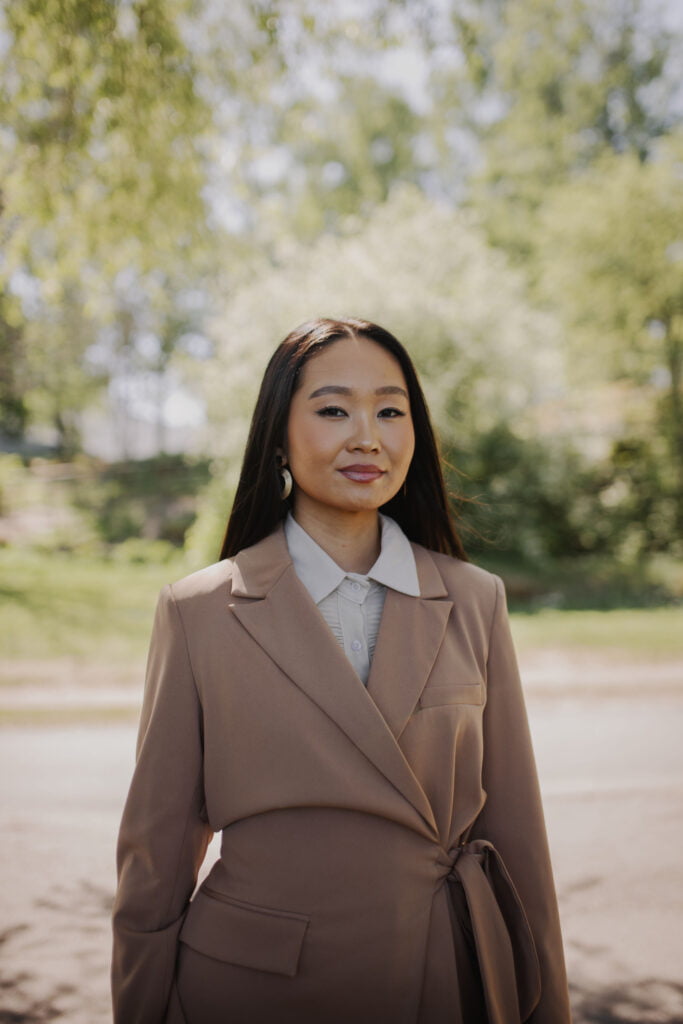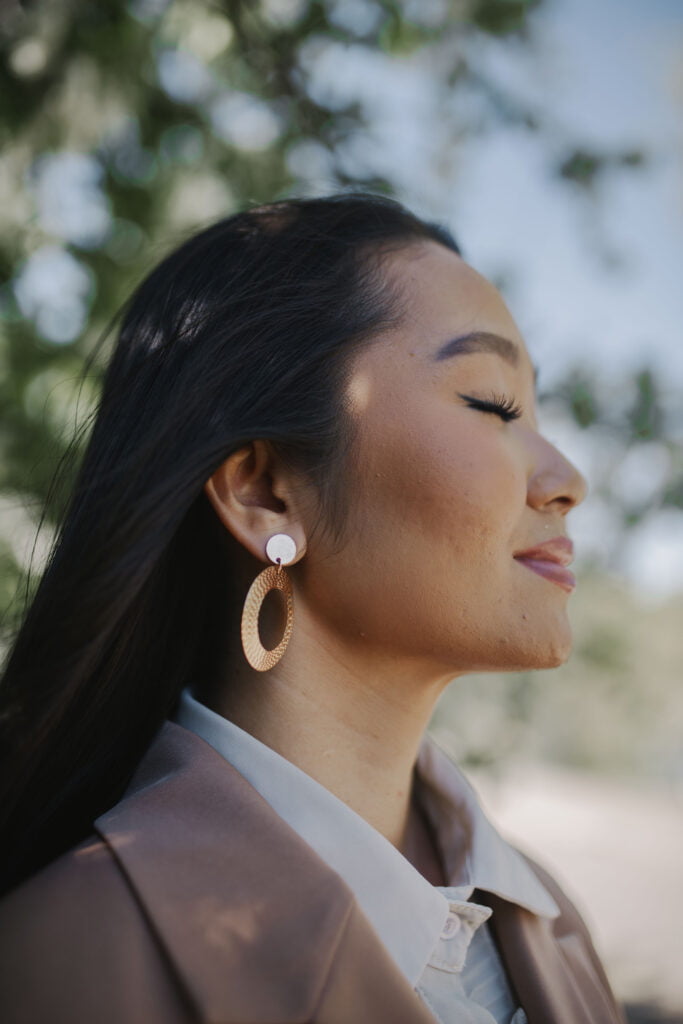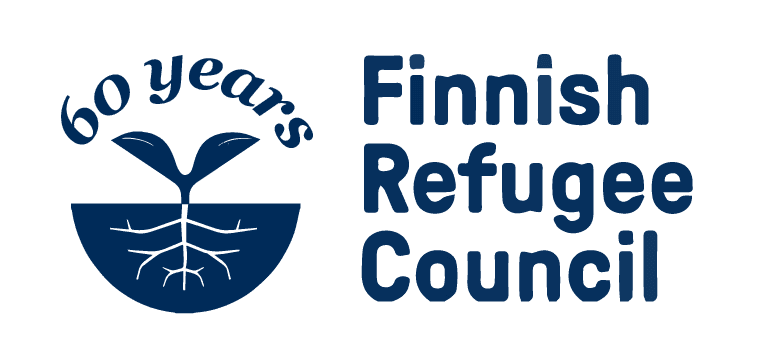© Julius Töyrylä
Finnish Refugee Council has chosen Sa Myer Oo from Vaasa as the Refugee of the Year 2024. The nomination was announced on Tuesday 18.6. in Helsinki.
Life as a child in a refugee camp
An 11-year-old girl sits on a bus and looks out of the window at the spring forest landscape that flashes by. The question in her mind is: “There are only trees here – where are they taking us?”. That girl is Sa Myer Oo, known as San, a Refugee of the Year 2024 who arrived in Finland with her family on a chilly day of May in 2007, coincidentally on her birthday.
San, her parents and three younger siblings came to the country from a refugee camp in Thailand, where they were selected by the UNHCR for resettlement in Finland. Like everyone else, San’s parents were forced to flee to a camp from Myanmar when soldiers attacked and burned their home village. San’s parents belong to the oppressed Karenni minority, so it would not have been safe for them to stay.
Sa Myer Oo (nickname San)
Age: 28 years
Family: Parents and four siblings
Lives in: Vaasa
Occupation: Child guidance counsellor and student of social services (graduating in December 2024)
Came to Finland: From a refugee camp in Thailand in 2007 through UNHCR resettlement program.
Special note: Has been a Miss Finland finalist.
At the time of her escape, San’s mother was pregnant. There was no health care in the camp, so the parents sought the help of a friend who lived near the camp. There, San was born, weighing only 2.5 kilos and with no medical assistance, yet still healthy. The baby and parents returned to the camp, and three more children were born into the family. According to San, the 11 years spent in the camp were not a normal childhood – life was full of uncertainty, insecurity and fear. Life was very restricted and outside the camp there were always guards at the gates.
San says she doesn’t remember much about her childhood in the camp. But she describes the family home made of bamboo and leaves, the mango trees in the yard and the big swing her father built.
Her father also made mud toys for the children, and the family raised fish and domestic animals. She remembers how all four siblings often sat on the swing and climbed trees together. However, as the eldest child, San had to take on a lot of responsibility and often helped her mother with everyday tasks.
– My mother was a teacher at the camp, so I helped a lot with my younger siblings and with the housework. Growing up in the camp, I never remember feeling like a child.
Citizenship strengthens identity
After arriving in Finland, the family settled in Hanko. The children went to summer school, where they learned Finnish and got to know about Finnish society. After the summer, San moved on to a preparatory class and made new friends. The teachers were supportive, and through the Hanko Free Church San found many interesting hobbies, such as dancing and choir singing.
– My childhood memories are warm, in Hanko I felt safe for the first time. Participation in various children’s summer camps, the support of coaches and teachers and a Finnish family who opened their door to us and showed us humanity, were very important to me and my family after all we had experienced. I also saw how well the children were looked after – in the refugee camps, adults didn’t always have the time or resources to look after the children because the families just had to survive,” says San.
Sometimes, however, the children were bullied and subjected to racist shouting in the yard of their home by other children. The situations were dealt with together as a family, and the siblings stood up for each other.
When San turned 19, she received her first identity card ever, a Finnish passport. This had a big impact on San’s identity and self-esteem – previously she often felt pain when people asked her where she was from. Now she was finally a citizen of a country and had the same rights as everyone else.
– When I got my passport, I cried, it really meant a lot to my identity. I used to be ashamed of my refugee status – it’s easy to think you’re worthless and don’t believe you deserve anything. Working on my past and becoming a citizen gave me back my dignity,” San smiles.
Encouragement takes to new places
After high school, San spent some time looking for her own path: depression affected her future plans and kept her at home. But her father encouraged her child, and soon San got a job as a car transporter. It was during this time that San remembers a pivotal encounter.
– A couple said to me, “San, you will go far in life”. Those little words of encouragement meant a lot to me and gave me courage. And look where I am today.
Since that encounter, a lot has happened in San’s life: volunteering with victims of human trafficking and their children in Cyprus, studying culture in Kauniainen and graduating as a children’s teacher in Helsinki. After that, San worked for six months in a kindergarten and then moved to Vaasa to study social work. She has also worked several times as a babysitter in children’s camps and as a childcare assistant in a language course for immigrant women. Currently, San works as an experience expert in the Kuule minua (Hear Me) project and in the Multiculturalism Council of the Nordic Welfare Region and helps international students with integration and everyday life issues.

– Through volunteering and my studies, I have gained a lot of important and eye-opening experience. Before I was insecure and didn’t believe in myself, but now I have courage to take opportunities, I want to challenge myself and I want better for myself and my future children. Last year I also participated in the Miss Finland contest, which gave me a lot of courage and confidence.
Together for the children of Finland and the world
San has a clear vision for the future – she wants to work with vulnerable people, but especially with children and young people.
– Children and young people are close to my heart. I want to show all children – both native Finns and children with an immigrant background – through my work and my example that it is possible to move forward in life, that everyone has a place in the world and that life has a lot to offer, as long as you give it a chance.
According to San, meeting children and young people and encouraging them to dream is everything. Through her own life and work, she has seen how young people can be miserable and the problems can be complex.
– Our children and young people need us. We adults sometimes forget to spend time with children during all the hustle and bustle and ask how they are doing. We need to set a good example in everything we do, and if we don’t guide them, who will? Our job is to raise our children and young people to be strong and courageous adults, whatever their background, in a changing, global world.
San’s heart also goes out to children living in the midst of war, without hope and without a home, even a homeland. She cites the UN Declaration on the Rights of the Child, which says that “every child has the right to citizenship”. Yet there are millions of children in the world who have no identity and no future. For those who have the power to influence and change things, San has a wish that they do not forget these children of the world.

Openness and humanity create cohesion
As Refugee of the Year, San wants not only to promote the wellbeing of children and young people, but also to break down the prevailing ‘we’ mindset. She is concerned that inequalities and gaps between people will widen unless people engage in dialogue and learn to trust each other. San says this requires work and shared responsibility for Finland and its future.
– We all need a sense of belonging. If people show each other that they don’t accept you or constantly say that you don’t belong here, it hurts. The newcomer must have the will to integrate into Finnish society, but the attitude of the in the hosting communities also has a big impact. People are capable of evil, but together we can also do a lot of good.
San wants to encourage people from refugee and immigrant backgrounds to invest in learning a profession and especially a language.
Language skills and learning are the key to society, she says, and have provided her with a wealth of valuable knowledge and skills. San also encourages people to let go of the past, without forgetting their own culture or language.
– The important thing is to have opportunities and then make the most of them. Be brave and make friends with people from different backgrounds and with different looks,” San concludes.
Further information and interview requests:
Marjukka Koskenkorva, Communications Specialist, Finnish Refugee Council
marjukka.koskenkorva@pakolaisapu.fi, tel. 045 133 3803

